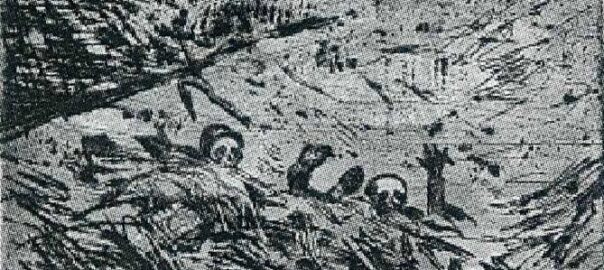Christopher Clark’s The Sleepwalkers provides a compelling account of the origins of the First World War.[i] This war, as we know, was cataclysmic: 20 million military and civilian deaths, and 21 million wounded. As Clark shows, Europe’s decision-makers were aware of these risks: “British Prime Minister Herbert Asquith wrote of the approach of “Armageddon” … [and] French and Russian generals spoke of a “war of extermination” and the “extinction of civilisation””. But while those in power were conscious of the coming horror, they did not grasp it “in a visceral way”. In this sense, the “protagonists of 1914 were sleepwalkers”; the dangers remained abstract, dream-like even.
Discussion of Clark’s ideas in relation to the war in Ukraine overlooks the disjuncture he draws between head and heart. That’s a mistake, as it’s precisely this kind of disconnect that characterises western policy and puts us on a dangerous path.
The west’s approach to this war consists of three interrelated aims. Firstly, arming Ukraine. As I write, the latest decision has been to supply Ukraine with hundreds of tanks, though there is already talk of providing Kiev with fighter jets. Secondly, prolonging the war to degrade Russian capabilities. We “want to see Russia weakened” was how US Defence Secretary Lloyd Austin put it in a press conference in April 2022. Significantly, this statement came not long after the west reportedly quashed peace talks taking place between Russia and Ukraine that were showing signs of progress. Thirdly, recapturing Ukrainian territory held by Russia, including the Crimea, an area Russians generally regard an integral part of their state. The west is committed to going “on the offensive … to liberate Russia-occupied Ukraine”, declared US general Mark Milley at the meeting of the Ukraine Defence Contact Group in January 2023. We should also note that some western officials openly speak of Russia’s dismemberment: representatives in the European Parliament recently called for “the creation of free and independent states in the post-Russian space”.
At the same time, western leaders frequently highlight the risk of escalation inherent in their approach. The Secretary-General of the EU’s External Action Service, Stefano Sannino, admits that supplying tanks to Ukraine will confirm Russia’s view that it’s in a “war against NATO and the west” and so increase the likelihood of the conflict spreading. Yet this is the line we are pursuing. In her address to the US Senate’s Armed Services Committee in May 2022, Director of National Intelligence Avril Haines assessed that “President Putin would probably only authorise nuclear weapons if he perceived an existential threat to the Russian state”. But the diminishment and destruction of the Russian state is exactly what western elites are seeking. And as Benjamin Abelow points out, if Russia did fire, the pressure on the west to retaliate in kind might prove impossible to resist. To say this outcome would be catastrophic is an understatement; at a minimum, it would be the end of the world as we know it.
We therefore seem to be moving towards Armageddon without really feeling its presence. We cognate the risks but are blithe to their reality. It would appear, then, that we are sleepwalkers too.
[i] Christopher Clark, The Sleepwalkers: How Europe went to war in 1914, Penguin Books, London, 2013
